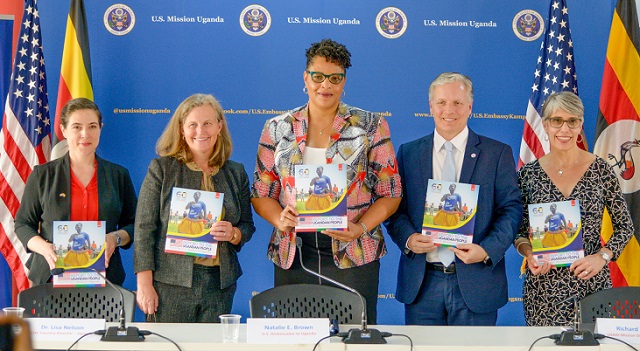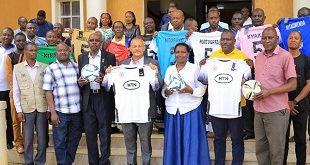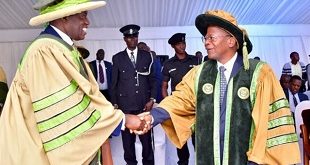
Not about dollars but impact on lives, says ambassador
Kampala, Uganda | RONALD MUSOKE | The U.S Mission to Uganda’s main focus remains ensuring that Uganda becomes a prosperous, secure, just and democratic country with healthy, educated and skilled citizens.
This was Natalie E. Brown, the American Ambassador to Uganda’s main message to Ugandans as she unveiled the sixth edition of the “Report to the Ugandan People.” The 2022 report was also a special edition as it coincided with the 60th anniversary of the U.S government’s engagement with the East African nation.
The special edition of the report included a timeline highlighting key milestones in the U.S-Uganda relations over the last 60 years, a map demonstrating how U.S programmes reach Ugandans in every district across the country, and a spotlight on the 20th anniversary of the U.S President’s Emergency Plan for AIDS Relief (PEPFAR)—a transformative U.S government initiative that has contributed over US$ 100 billion in the global fight against HIV/AIDS, including more than US$5 billion in Uganda.
“This year’s report is unique because we are not only highlighting our annual activities, but also the U.S partnership with Uganda over the past 60 years,” Amb. Brown said on Feb.8 at the American Centre in Kampala.
“We are proud to showcase some of the many accomplishments we have had in working together with Ugandans toward a more peaceful, prosperous, healthy, secure and democratic future. Our work—all our initiatives and programmes–align with Uganda’s Vision 2040—Uganda’s development plan,” she said.
Amb. Brown was joined at the unveiling of the report by Richard Nelson, the Mission Director in Uganda for the U.S Agency for International Development (USAID); Dr. Lisa Nelson, the Director of the U.S Centres for Disease Control and Prevention (CDC) country office in Uganda; Mary Borgman, the PEPFAR Country Coordinator, and Ellen Masi, the American Embassy’s Public Affairs Counsellor.
Amb. Brown noted that last year (2022) the American government gave Uganda assistance funding amounting to about Shs 3.4 trillion or US$ 930 million which is right about the same amount it spent in 2021.
Not about dollars but impact on lives
However, she noted that while these figures are significant, “the story of America’s partnership with the Ugandan people is not one of dollars and figures, but of lives impacted.”
“From the first Ugandan Fulbright scholar to study in the United States in the 1950s, to the most recent cohort of Mandela Washington Fellows under the Young African Leaders Initiative (YALI), alumni of the U.S government supported exchange programmes have made a significant impact in their respective sectors in Uganda, be it business, academia, education, public management, civil society, the arts, medicine, public health, the media and many more,” the report reads in part.
Among its prominent alumni of the exchange programme featured in the report is Joyce Mpanga—Uganda’s first Minister of Women in Development.
There is also Dr. Titus Alicai, the Senior Principal Research Officer at the National Agriculture Research Organisation (NARO) at Namulonge who benefitted from USAID’s Manpower for Agriculture Development Training Programme in the 1990s. Dr. Alicai, a plant virologist, is credited alongside other scientists for developing virus resistant cassava varieties in Uganda.
“You may not always see our flag on large buildings or billboards, but thanks to the United States’ investment, millions of Ugandans are living healthy, learning better, earning more, and participating more fully in their communities.”
Uganda’s health sector is probably where the American Mission in Uganda has had the greatest impact. Today, more than 1.3 million Ugandans living with HIV are receiving life changing ARV treatment, thanks to PEPFAR programme. “With ARV treatment, they can pursue their education, start a family, build a career, prevent further infection, and expect to enjoy a long, healthy life,” the ambassador noted.
Recently, a research study shared at the PEPFAR Science Summit in Kampala shows that the tremendous scale up of PEPFAR-supported HIV treatment in Uganda since 2004 has averted almost 500,000 estimated HIV infections, including over 230,000 babies born infection-free to HIV-positive mothers; and this investment prevented nearly 600,000 deaths.
More broadly, the United States’ programming in the health sector has transformed Uganda’s ability to respond to numerous infectious diseases and other health challenges, from COVID-19 to the Ebola virus.
In 2022, U.S programmes focused on mitigating the impact of the COVID-19 pandemic. By the close of 2022, the U.S government had donated 18,190,420 COVID-19 vaccine doses to Uganda, free of charge.
In support of Uganda’s national vaccine rollout, the U.S provided technical and financial support in data management, risk communication, health worker training, human resources support, supply chain strengthening, and cold storage capacity.
U.S health programmes also continued to focus on controlling HIV/AIDS, preventing and treating tuberculosis (TB), and malaria, maternal and child health, family planning, nutrition, water and sanitation services, and strengthening systems for improved health service delivery.
Covid-19 lockdown & home learning study
When COVID-19 shut down schools leaving learners in grades 1-3 unable to return to school for two years, the USAID formed 14,000 Home Learning Study Groups led by 5,000 community volunteer teachers.
The teachers conducted Early Grade Reading lessons for over 330,000 grade 1-4 learners in safe spaces within their communities.
USAID also supported the production of radio instruction for learners and teachers, and parents on 16 radio stations in 20 districts. Up to 15 “Tips for Teachers” episodes and 24 “Parents as Partners” episodes guided parents on supporting the reading habits of their children and on how to prevent violence at home.
Mubende Ebola outbreak
The U.S government also mobilized support for the government of Uganda’s response to the 2022 Sudan Ebolavirus outbreak and helped minimize outbreak spread.
Several U.S government agencies working through the U.S Mission in Uganda and the Ministry of Health provided US$ 34 million (Shs125 billion) for the response supporting efforts in the areas of coordination, case management, surveillance, diagnostics and laboratories, infection prevention and control, risk communication and community engagement, safe and dignified burials, psychosocial/survivor programme support, research, treatment for patients in Ebola Treatment Units, border health.
“Disease outbreaks may be inevitable, but with the right preparation, we can control them and mitigate their effects,” Amb. Brown said.
Going forward, the U.S government is working with the Ministry of Health to help prepare for and mitigate effects of the next pandemic by strengthening health systems and improving surveillance and early identification capacity for disease threats.
The U.S Centres for Disease Control and Prevention (CDC) has already trained disease detectives to identify and contain outbreaks before they become epidemics. The CDC has helped the Ministry of Health to establish six Public Health Emergency Operations Centres, which boast surveillance systems to monitor disease threats, and a national laboratory network to identify sources of outbreaks.
The U.S Defence Threat Reduction Programme (DTRA) has enabled the Uganda Wildlife Authority acquire a biosafety level-2 laboratory. The laboratory gives UWA the capability to detect, surveil, and report emerging and re-emerging animal diseases, in accordance with the World Health Organization (WHO) guidelines to limit zoonotic outbreaks.
Nurturing entrepreneurial spirit among women
Besides the health sector, the US Mission has worked on programmes aimed at improving people’s livelihoods, especially the women. “That’s why the United States supports Ugandan businesses and entrepreneurs. With over 343 graduates of the Academy of Women Entrepreneurs (AWE)—we are empowering women business owners to turn their creative ideas into jobs for the community.”
“From Gulu and Mbarara to business owners in Jinja, Fort Portal, Mbale and Kampala, we have seen over 280 of the women formally register their businesses, set up bank accounts, and join the formal economy.”
Underpinning values
The Report to the Ugandan People also highlights the values that underpin America’s partnership with Uganda. The Ambassador enumerated the values of transparency and accountability, to both the American people and the Ugandan people.
“Let me be clear, every dollar the United States invests in Uganda is held to the highest standards of oversight; corruption is a significant challenge in Uganda and many countries throughout the world,” she said.
“And we are not immune to it in the United States; that’s why we have very rigorous processes in place for monitoring and evaluating how U.S assistance funds are spent. “
“We have even suspended programmes due to underperformance. The United States strongly supports initiatives to promote financial transparency and accountability for the use of public resources, whether yours or ours.”
Amb. Brown also underscored why the United States believes civil society organisations play a critical role in supporting service delivery in Uganda, especially in the health, education and other sectors; in promoting accountability; advocating for effective laws and policies; and in advancing the rights of marginalized people.
“That’s why the vast majority of U.S assistance and elsewhere around the world is provided not to governments but implemented through partner organisations and civil society groups.”
“I am proud of the implementing partners and civil society organisations, many based in Uganda and Ugandan-led, with which we work that are reaching nearly every district across Uganda in the areas of health, education, democracy, and economic growth.”
“The back cover of the report lists 25 organisations we work with in Uganda but there are many more. Through the 13 U.S government agencies that comprise U.S Mission in Uganda, we work with more than 100 partner organisations in Uganda.”
The ambassador also explained why the U.S believes that every country’s most valuable resource is its people. That’s why, she said, the overwhelming majority of U.S assistance to Uganda is focused on building human capacity so Ugandans have the knowledge, skills, and resources they need to succeed not just today, but tomorrow.
“You see this in U.S government-supported exchange programmes like the Mandela Washington Fellowship. You see this in programmes like the YES Academy, which developed creative business and performance skills for young musicians.”
“And you see it in the U.S Mission’s mobile education space—the Nile Explorer Bus—as it transverses the country bringing STEM—and health-focused learning activities to students across the country.”
She noted that her government believes the assistance it offers Uganda today should not become a burden to the Ugandan people tomorrow.
“That’s why the vast the majority of United States assistance is direct to projects and not loans that must be paid back by future generations of Ugandans,” she said, “The only re-payment we look for from beneficiaries of U.S assistance is that they “pay it forward” by applying the opportunities, knowledge, and tools gained through our programmes to further the development of their communities and Uganda.”
 The Independent Uganda: You get the Truth we Pay the Price
The Independent Uganda: You get the Truth we Pay the Price



Let us not forget who created, developed and holds the Patents to all these man-made scourges (HIV/AIDS, Covid-19 et al).
Total Double-speak, “we’ll poison you then treat you with more poison”
Mscheeeew